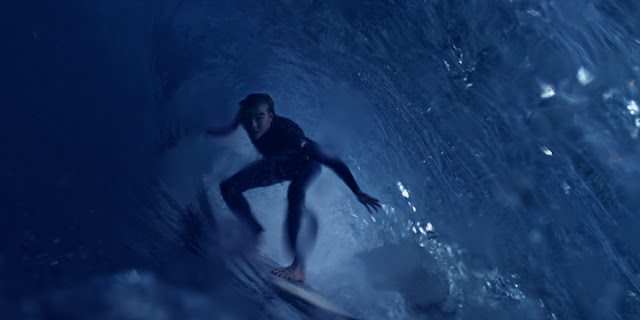BFI LFF 2016: HEAL THE LIVING - Dir. Katell Quillévéré
A synopsis can sometimes do a film no favours and describing the story in Katell Quillévéré’s third feature would bring to mind any number of hospital dramas. The key to the film’s power lies in the Quillévéré’s execution: finding the small moments of humanity amongst the enormity of the situation the characters face. It’s life and death, but not as the movies know it.
Adapted from an acclaimed novel by Maylis de Kerangal, Heal The Living introduces Simon (Gabin Verdet) climbing out of his girlfriend’s bedroom window to catch the early morning tide with two surfing friends. In strictest terms, he’s travelling through the night to stand in the sea on a slab of polyurethane, but it’s his passion for the surf that Quillévéré captures (through some quite breath-taking underwater and in water photography). Just hours later, Simon is declared brain dead after a severe car crash and his parents Marianne and Vincent (Emanuelle Seigner and Kool Shen) must decide whether to donate their son’s organs. There’s no extra special reason why we’re meant to care about Simon but we do care, simply because he was killed doing what he loved on the cusp of the prime years of his life.
The screenplay (from Quillévéré and Gilles Taurand) further emphasises the realistic nature of this story with interactions and details, indicative of the disorder of daily life, that have no repercussions on the main story. This adds depth to all of the characters, demonstrating that they exist beyond the confines of this story. Vincent misses several calls from Marianne because he was wearing ear defenders at work, but his late arrival to the hospital doesn’t affect the outcome. It’s simply a quirk to the story but demonstrates that he wasn’t simply sat waiting for a phone call all that time.
Quillévéré brings a deliberately unobtrusive style to her direction whilst Tom Harari tones downs the warm yellows in his cinematography to bring out the more clinical blues of the hospital environment. When both then depart from this style at particular moments, the emotional impact is inescapable. A piano motif from Alexander Desplat is twisting and intricate but also deliberately cyclical, reinforcing the film’s themes of the minute complexities of life.
The story switches to Paris and to Claire (Anne Dorval) whose deteriorating heart condition forces her to move closer to the hospital, with the help of her sons Maxime and Sam (Finnegan Oldfield and Théo Cholbi). Simon was only thinking about his life in the future before it was taken from him, but Claire is thinking only of the life she has lived and making the most of the time left. But there’s no big gestures or trips to swim with dolphins, instead it’s taking in a concert or laughing along to E.T.. The earlier hospital setting brings back memories of Julian Schnabel’s The Diving Bell and the Butterfly and both films encourage us to cherish the seemingly minor moments in our lives, driven by our unique passions and interests.
Before we meet the organ donation co-ordinator Hamé (Steve Tientcheu) who will ultimately join these two stories together, we follow the crowds of people from which he will emerge; he, like everyone else in the film, is as inherently normal as the rest of us. Heal The Living celebrates the normal people who choose to do the elaborate work to accomplish the extraordinary.
HEAL THE LIVING played at the 60th BFI London Film Festival and is in UK cinemas on 28th April 2017.





Good review.
ReplyDeleteThanks!
ReplyDeleteI would recommend you to watch Trash Humpers but I couldn stop laughing
ReplyDelete